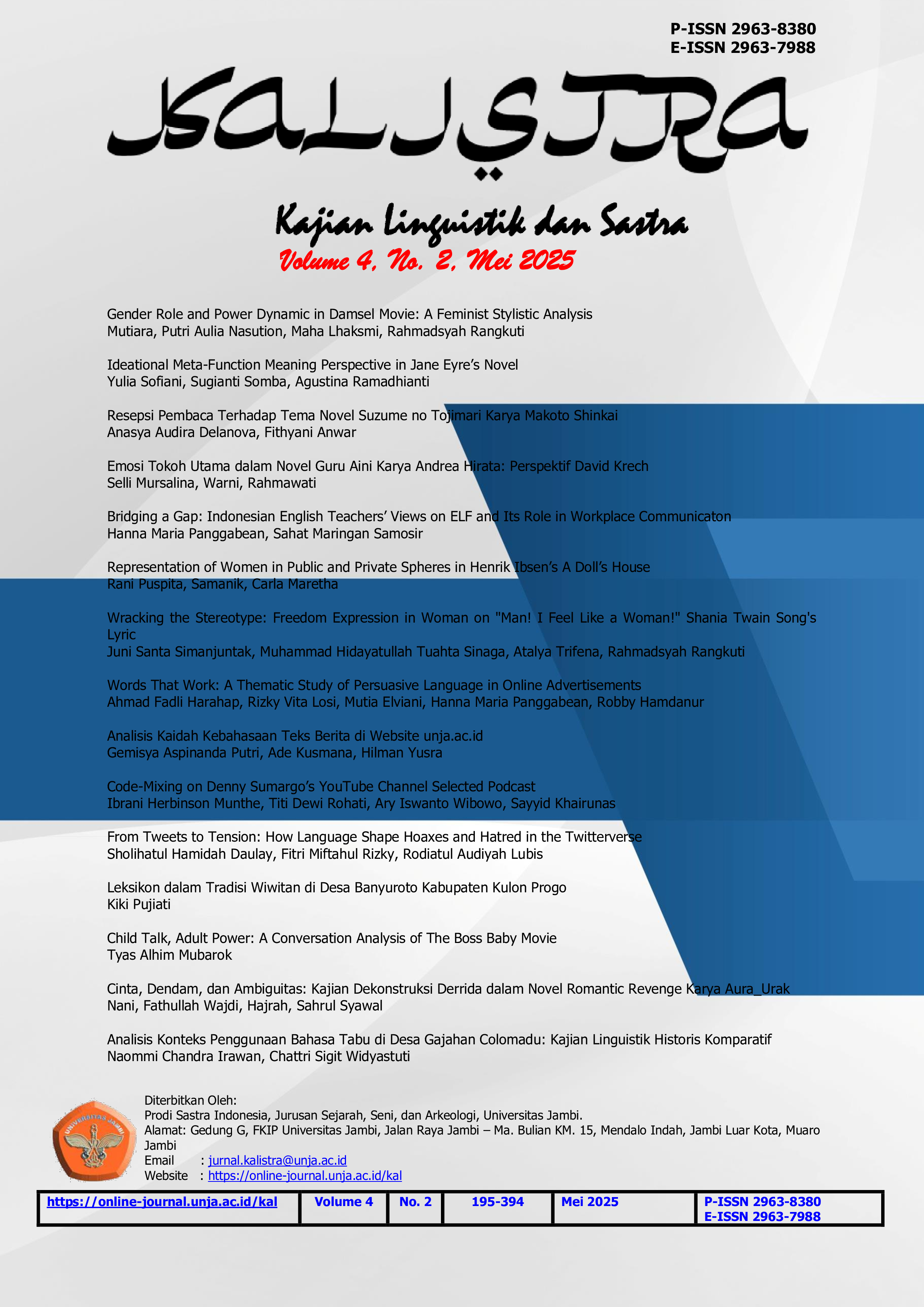Teacher Views On Text Learning Microblog Assisted Observation Reports For High Schools
DOI:
https://doi.org/10.22437/kalistra.v4i2.46139Keywords:
text, learning, microblogAbstract
Learning by utilizing technology such as microblog in learning is believed to provide comfort and flexibility, more effective and efficient learning opportunities and experiences, improve the personal and institutional quality of students because the material studied is more interesting and not boring. This study aims to find out the expression of the teacher's views on learning the text of the observation report assisted by microblog. This study uses a descriptive qualitative method. The design of this study aims to reveal the views of Indonesian teachers regarding digital learning, the forms of activities, the methods used, and the difficulties encountered during the implementation of Indonesian language learning at school. Data collection was carried out via a Google form which was distributed to Indonesian language teachers in senior high schools. Data analysis using interactive model Miles and Huberman. The results of the study show: 1) all Indonesian teachers have the view that microblog-assisted learning is very important to implement, 2) Indonesian language learning activities especially in the text of the observation report assisted by microblog can make teachers' creativity unlimited and support a better learning process for students . The benefit of this research is that students become more active and interested in participating in learning.
Downloads
References
Campbell, J. P., & Turner, J. E. (2018). Debunking the myth of exercise induced immune suppression: redefining the impact of exercise on immunological health across the lifespan. Frontiers in immunology, 9, 648.
Darmika, Dkk. (2018). Penggunaan E-Learning dalam Pembelajaran Bahasa Indonesia di SMA Negeri Bali Mandara. Jurnal Pendidikan Bahasa dan Sastra Indonesia Undiskha, 8(2), pp. 260-272.
Doğan, Y., & Simsar, A. (2018). Investigation of preservice preschool teachers’ views on environmental problems and relevant suggestions of solution. International Electronic Journal of Elementary Education, 11(2), 151-159.
Karademir, A., Yaman, F., & Saatçioglu, Ö. (2020). Challenges of Higher Education Institutions against COVID-19: The Case of Turkey. Journal of Pedagogical Research, 4(4), 453-474.
Lai, Chun. 2017. Automous Languange Learning with Technology: Beyond The Classroom. Bloomsbury Academic An imprint of Bloomsbury Publishing Plc.
Leavy, P. (Ed.). (2017). Handbook of arts-based research. Guilford Publications.
Lestari, S. (2018). Peran teknologi dalam pendidikan di era globalisasi. Edureligia: Jurnal Pendidikan Agama Islam, 2(2), 94-100.
Miles, MB, Huberman, AM, & Saldana, J. (2014). Analisis data kualitatif buku sumber metode (3rd ed.). Publikasi Sage, Inc.
Prajana, A., & Astuti, Y. (2020). Pemanfaatan Teknologi Informasi dan Komunikasi dalam Pembelajaran oleh Guru SMK di Banda Aceh dalam Upaya Implementasi Kurikulum 2013. JINOTEP (Jurnal Inovasi Dan Teknologi Pembelajaran): Kajian Dan Riset Dalam Teknologi Pembelajaran, 7(1), 33-41.
Prihatini, A., Sugiarti, S., Ambarsari, T. A. B., & Nisa, I. N.(2022). Kompetensi Pedagogik Guru SMA dalam Menerapkan Pembelajaran Multiliterasi sebagai Wujud Merdeka Belajar. Edukatif: Jurnal Ilmu Pendidikan, 4(5), 6823-6831.
Rahman, I. S., Murnaka, N. P., & Wiyanti, W. (2018). Pengaruh Model Pembelajaran Laps (Logan Avenue Problem Solving)-Heuristik Terhadap Kemampuan Pemecahan Masalah. Wacana Akademika: Majalah Ilmiah Kependidikan, 2(1), 48-60.
Ramadhani, S. P., & Zulela, M. S. (2020). Profesional pedagogy guru terhadap perubahan pembelajaran di era digital. Jurnal Elementaria Edukasia, 3(2).
Santi, W. A., Utomo, B. B., & Chalimi, I. R. (2021). Pemanfaatan Fasilitas Belajar dalam Menunjang Proses Pembelajaran PPKN Peserta Didik kelas VIII. Jurnal Pendidikan dan Pembelajaran Khatulistiwa (JPPK), 10(1).
Sufanti, M., Fatimah, N., & Atmojo, D. T. (2019). Persepsi Guru terhadap Pembelajaran Apresiasi Cerita Pendek Bermuatan Pendidikan Toleransi. Kajian Linguistik Dan Sastra, 3(2), 160-171.
Sugiyono, S. (2016). Metode penelitian kuantitatif, kualitatif, dan r&d. Alfabeta.
Sukmadinata, N. S. (2015). Pengembangan Kurikulum Teori dan Praktek cet. 7. Bandung: PT Remaja Rosdakarya.
Taufiqulloh, T., Sulistianingsih, E., & Yuvita, Y. (2017). Pengembangan Model Penilaian Diri (Self Assessment) untuk Mempromosikan Otonomi Belajar Mahasiswa pada Mata Kuliah Menulis yang Berbasis Genre (Genre-Based Writing).
Downloads
Published
How to Cite
Issue
Section
License
Copyright (c) 2025 Dewi Jayana, Dharma Yunita

This work is licensed under a Creative Commons Attribution-ShareAlike 4.0 International License.
Kalistra: Kajian Linguistik dan Sastra is licensed under Creative Commons Attribution-ShareAlike 4.0 International License.
Authors who publish their manuscripts in Kajian Linguistik dan Sastra agree to the following terms:
1. The copyright in each article belongs to the author.
2. The author acknowledges that Kajian Linguistik dan Sastra reserves the right to be the first to publish under a Creative Commons Attribution-ShareAlike 4.0 International License (Attribution 4.0 International CC BY-SA 4.0).
3. Authors may submit articles separately, arranging for non-exclusive distribution of manuscripts that have been published in this journal to other versions (e.g., delivery to the author's institutional repository, publication into a book, etc.), acknowledging that the manuscript has been first published in Kajian Linguistik dan Sastra.
















